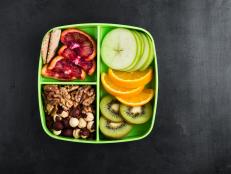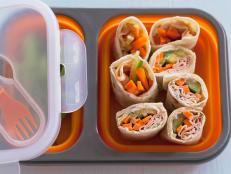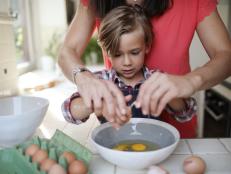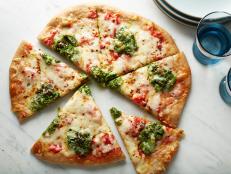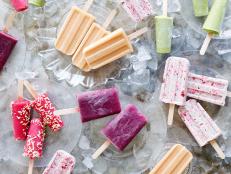Great First Foods for Babies
Go beyond the jarred stuff with these healthy options.

Around age six months, it’s time for the fun of feeding babies to begin. Previously, the recommendation was to start rice or oatmeal cereal around four months. But now, the American Academy of Pediatrics recommends parents start solid foods around six months of age, when a child meets developmental milestones.
While breast milk or infant formula cover all the nutrition needs at first, babies begin to need additional nutrients for cognitive development, at around four to six months. These nutrients include iron, zinc, vitamin B12, choline and DHA and they should come from solid food. While infant cereals can meet some of these needs (especially for iron), foods like egg yolks, meatballs and avocado can also fill the gap. Additionally, nutrition experts point out that allowing babies to experience new tastes and textures when they are first feeding themselves can help them in many ways, including:
- Developing fine motor skills - like pinching and picking food up with fingers
- Developing chewing skills
- Learning to accept and like a variety of foods
Min Kwon, mom and dietitian at MJandHungryman.com recommends baby-led weaning, in which babies feed themselves their first foods. Instead of parents spooning infant cereal into a baby’s mouth, this approach focuses on large-enough pieces for a baby to grasp and chew, without choking. It emphasizes freshly prepared foods and can be more convenient. “With my own baby, I had zero patience with the airplane spoon game. Instead, my six-month old baby learned to feed himself 35 new foods in about a month. Very, very slowly. But surely.”
Another advantage of eating more foods like eggs and peanut-containing foods over only infant cereal is that it can help prevent food allergies. Researchers have shown that feeding babies these foods early in life can help prevent egg and peanut allergies, and possibly even allergies to fish, seafood, dairy, nuts, soy and wheat. If a baby has skin eczema, check with a pediatrician before introducing these foods.
Here are some first foods to start during the sixth month (or when your baby shows developmental readiness):
- Cooked egg
- Avocado
- Peanut powder mixed into applesauce
- Peanut puffs
- Plain full-fat yogurt
- Cheddar and mozzarella cheese
- Soft meatballs, preferably homemade without salt
- Brown rice or thick oatmeal mixed with infant cereal
- Chickpeas and butter beans
- Lentils
- Cucumbers, mushrooms and tomatoes
- Cooked zucchini, broccoli, cauliflower, sweet potatoes, potatoes, beets
- Cooked onions and garlic
- Bananas, pears, apples, peaches, strawberries
And one note, if a baby wrinkles her nose at a food after the first taste, try again. It can take up to 30 tries before a baby decides she likes a food. Serve it again and again for the next several months. Researchers have found that vegetable and fruit consumption drops off considerably at nine months and consumption of non-nutritive convenience finger and snack foods increases; to avoid this, keep trying varieties of the foods listed above.
So is infant cereal even necessary? Probably. If babies don’t eat beef or dark-meat poultry or fish daily, it’s tough for them to get enough iron and zinc. These nutrients are necessary for cognitive development and immunity. So try to work at least 1 serving (1/4 cup) of cereal into baby’s meals throughout the day: mix it with avocado or eggs, sprinkle on toast or veggies, mash with beans. Either rice or oatmeal infant cereal are a good choice are long as they are fortified with iron and zinc.
By offering several different types of foods, other nutrient deficiencies can be avoided. Keep the following nutrient-rich foods in frequent rotation after age 6 months and beyond:
- DHA and omega-3 fats: fork-mashed salmon and sardines
- Choline and lutein: eggs, edamame, broccoli
- Vitamin D: fish, eggs, mushrooms
Most importantly, enjoy this new healthy adventure of feeding your baby.
Related Links:
Serena Ball, MS, RD is a registered dietitian nutritionist, food writer, and recipe developer. She blogs at TeaspoonOfSpice.com and is the author of the best-selling The 30-Minute Mediterranean Diet Cookbook. Follow her @TspCurry on Twitter and Instagram.

























